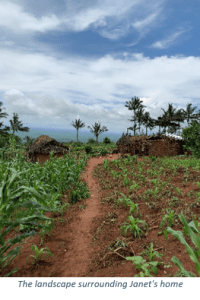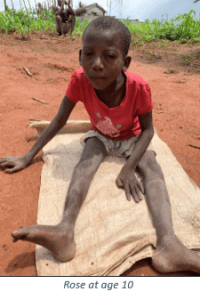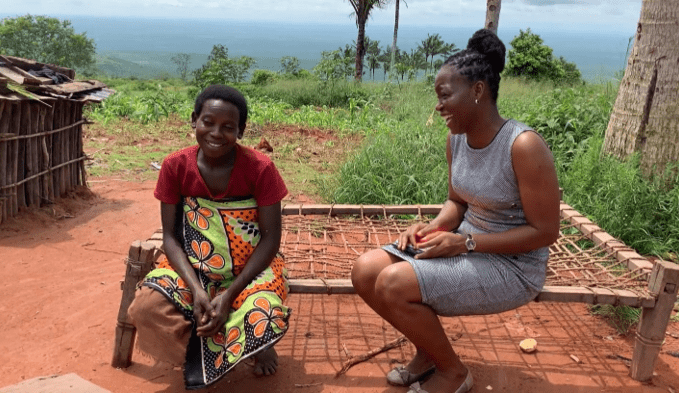The Road to Inclusion: A Crucial Journey
Posted on May 24, 2024
Beliefs, Child, disability, education, Health, International, marginalized, stigma, vulnerable
Last November, I had the opportunity to meet Janet, a young mother of four children who lives in a remote area of Kenya. As I journeyed with other Kupenda staff to her home, we drove up an unpaved mountain and then trekked on foot down a dirt trail. The mountaintop view revealed lush vegetation and blue skies as far as the eye could see. Although she lives in a largely isolated area, her story is ultimately one of community.
When we arrived, Janet welcomed our group with a smile and offered us a place to sit and fresh-picked fruit. She also introduced us to her first-born daughter, Rose. Like many 10-year-old girls, Rose loves to exchange stories with her friends, play with toys, and sing songs. She was also born with a cerebral palsy, a disability which affects her movement and posture.
Crossing Paths

A number of years ago, one of the leaders in Rose’s community informed her about Kupenda’s programs for families impacted by disabilities. When staff came to her area, Rose made plans to visit and learn more. Even though her daughter was not yet old enough to attend school, Kupenda partnered with her to receive assistance at home, including nutritional support, counseling services, and a wheelchair.
When Rose grew older, Janet hesitated to take her daughter to school. She wasn’t sure that Rose would be able to learn like the other children. Kupenda staff counseled her on the importance of education for all children and, as a result, Janet enrolled Rose in the Timboni Special School.
Today Rose receives weekly therapy services at the school and engages in learning activities tailored to her needs. In Janet’s words,
“I have more confidence that my child can learn. I have seen improvement in her speech, and she can express herself clearly. Sometimes she sings school songs and can recognize some numbers, especially when playing with her siblings at home. That has changed my perception about her.”
As she looks to the future, Janet dreams that, one day, Rose will be able to finish her education, secure a job, and lead an independent life.
In the meantime, Kupenda staff continue to work with leaders in Rose’s community to educate them about the medical causes of disability, appropriate intervention, and the need for inclusion. With each disability training, communities are better equipped to support and embrace people of all abilities.
Reflections on Inclusion
 Today as I reflect on my visit, I am still touched by Janet’s warmth, honesty, and hospitality. In fact, meeting her and her daughter, Rose, ended up being one of the highlights of my stay in Kenya.
Today as I reflect on my visit, I am still touched by Janet’s warmth, honesty, and hospitality. In fact, meeting her and her daughter, Rose, ended up being one of the highlights of my stay in Kenya.
The visit was a reminder that inclusion often doesn’t follow the path of least resistance; it requires intentional effort, thoughtful planning, and maybe even additional financial resources. But the fruits of that journey are worth the time and effort.
When people of all abilities are included, society becomes more diverse, equitable, and vibrant. More specifically, inclusion leads to increased accessibility for all, diverse perspectives, enhanced creativity and problem-solving, social cohesion, and personal empowerment. Ultimately, the inclusion of people with disabilities isn’t a matter of compliance or altruism. It is a fundamental aspect of creating more fair, diverse, and thriving communities.
Want to keep updated on Kupenda’s work?
Follow us on Facebook, Instagram, LinkedIn, TikTok, YouTube, and Twitter.
Learn more about Kupenda in our podcast.
Sign up for our newsletter.
Or sponsor a child in need for just $30 / month.



Leave a Reply